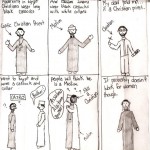 Part I of II of this article.
Part I of II of this article.
After speaking to students who had Kathy Boudin as a professor, I spoke to two students in the Social of Social Work who did not have her as a professor, to get a sense of what kind of impact she was having on the school in particular. Then, I went out to two main plazas on the Columbia campus, and asked 61 students, a mix of graduate and undergraduate students from different parts of the university, what they thought of Kathy Boudin. Four knew who she was. These interviews are printed below. Two interviews are presented with the accompanying audio; these are students who were willing to give their names in this article.
* * * * *
Social Work Student 1: I’m not really aware of the situtation, but I think that if somebody has gone through the process of being rehabilitated — and clearly, she’s on the right track to getting her life together and everything — I think that that gives a different perspective to somebody who can come in and teach about a certain subject that she has firsthand knowledge about. I think that’s really beneficial to the school, and really beneficial to any work that people do with the population in the future.
Erik Campano: Have you seen her, talked to her, had any contact with her at all?
No.
OK. Have you heard any other students and faculty talk about her?
No. I know a couple students that have taken her, that they’re supportive, but I haven’t talked to them about it.
Here, I’m going to actually just read off the comments from my latest article. So, people want to know what kind of job she’s doing, what are the views that she teaches — but you wouldn’t really be able to say that.
No, I have no idea.
Oh, here’s one. Here’s one you probably can answer. What type of signal does it send to the students? Hey it’s OK to participate in an act of murder. You can still get a position at a prestigious college. So, have you been sent that message, that it’s OK to participate in an act of murder?
No. Not at all. I mean, just, I really don’t, I mean, I’m not, like I said, I’m not super-familiar with the case. But from what I understand, she did spend — she did pay her dues —
OK.
— and I think that, like I said, it gives a different perspective, and I think that as far as, like, the leadership here at CSSW, if they believe that she is a good candidate, and she has a lot to say, and she has a lot to teach, then I don’t see any detriment to having somebody who has that firsthand knowledge teaching. I mean, I don’t know exactly what she teaches. I don’t know what goes on in her classes. But I do know that, overall, you know, the leadership here at CSSW has, like, a blanket kind of outline as to what she should be teaching, so it’s not as if she isn’t being supervised in some way.
Right, right.
You know what I mean? So…
So you think she is being supervised by the administration?
Well, I mean I think all professors are —
Sure.
— to some level.
But in this, like, one commenter said should have extra supervision, because of her prison record. Do you agree? Or do you think that’s true, or it’s happening?
I would disagree with that. I don’t know. I don’t really think so. I mean, I think that that’s kind of like, the nature of social work. The nature of social work is the belief that people can change, and the belief that people are inherently good, and I think that it would be going against what CSSW and social work represents, if we were to immediately not allow somebody from, like, bettering their lives, from coming out of, you know, this place of rehabilitation to become, to have the ability to be a professor at a prestigious university. I think it’s really — and then it would go against the grain of what social work is about, to not believe that people have that ability in themselves to do that.
Is there any chance you might have her in the future?
No, I’m graduating in May.
OK. Great, so you’re not saying these things to get a good grade.
No.
If you would like to give your name, it would strengthen the piece, but you’re not required to. You can remain anonymous.
I would prefer to remain anonymous, just because I don’t — I’m not super aware of the case and everything, so I don’t know how, like, that would come back to — if I say something that’s not factual.
* * * * *
Audio of this interview: Columbia Social Work Student Gabriel Mendoza Speaks About Professor Kathy Boudin
So, I have been covering the Kathy Boudin case, which has been in a lot of media recently. But nobody’s asked students what they think of her. So that’s what I’m doing.
Social Work Student Gabriel Mendoza: Oh, yes.
So, yeah, have you taken her?
I actually haven’t, but I’ve had — a lot of my friends have taken her, and they say that she’s a phenomenal teacher, that she draws from real-life experiences, and that she really integrates like a restorative measure of practice in her work, which is really important in this.
OK. Have you had the chance to see her, talk to her, anything?
She has come to our class, and she was a big player in the Beyond the Bars campaign, which we held here at Columbia, and she just encouraged people to be a part of the Beyond the Bars campaign, and advocating for, like, people’s rights in prison.
OK, can you just explain, the Beyond the Bars campaign, was sort of a —
It was a conference held at Columbia University School of Social Work like two weeks ago, and it was a huge, where, a huge, like, conference where they invited various organizations and people to talk about the criminal justice system, and its state right now.
OK. What views does she teach?
I actually have never had her in class, so I wouldn’t know.
Or, at the conference, do you get a sense of what views she holds?
She’s just very progressive, I would say. She draws from personal experiences, so obviously, and I think she’s an amazing person from what I’ve heard, and from one of her speaking [unintelligble]
OK, so, my commenters, I’m just going to read to you the comments, so you can respond to them. One person said, “What type of signal does this send to the students? It’s OK to participate in an act of murder. You can still get a position at a prestigious college.” Have you been sent that signal?
I haven’t been sent that signal at all. I think, I don’t really know the particulars of the case, but I do know that, like, she did serve 22 years in prison, and she does feel sorry and regret what she did —
Sure.
— and she does incorporate that into her teachings, and that’s where the restorative justice component aspect of her teachings comes in.
So you’ve seen her express remorse for her crimes?
I haven’t, but I’ve heard students say that she does in her class and in her teachings.
And another person, you know, is worried that she is a radical or a terrorist still. Would you use either of those words to describe her?
No.
Is there any chance you will have her as a teacher in the future?
I don’t think so, actually. We’re in a different line of practice.
So you’re not saying any of this to get a good grade?
No.
It would strengthen the piece if you would give your name.
Sure. Gabriel Mendoza.
* * * * *
Audio of this interview:
Columbia Undergraduate Bradford Reed Speaks About Professor Kathy Boudin I
Columbia Undergraduate Bradford Reed Speaks About Professor Kathy Boudin II
OK, what part of Columbia are you in?
Columbia Undergraduate Bradford Reed: I’m in Columbia engineering. I’m a sophomore now. I was in the College my freshman year but I transferred after my freshman year —
So you’re an undergraduate.
Yeah, undergrad.
OK. So you’ve heard of Kathy Boudin. What do you know about her?
I just know that she was involved in some radical black power movement, or like, a civil rights movement, and they ended up doing some sort of robbery, and she ended up killing a person, and eventually got released on bail and now is a successful professor, and talks a lot about the criminal system and how to make it better and such.
Have you heard anything about her views, or what she’s like as a person?
Not particularly, I mean most of what I’ve read — I’ve read two articles and it’s just people’s opinions on the idea of having a convicted murderer as a successful, high profile professor at an institution like Columbia.
So you consider her high-profile?
I consider her high-profile now just because of the media blow-up. I wouldn’t say that she was high-profile before the media blow-up.
Do you have an opinion on whether she should be a professor?
Not really. I mean, like, I would say — sorry — I don’t know particularly enough about her to judge her, but at the same time, I’ve got very, sort of, particular views on the idea of what happens to a person socially after they’ve killed somebody. And I think that we venerate soldiers all the time, and they kill innocents all the time, too. And so why are we going to arbitrarily pick out one person and say that she can’t be successful after having killed an innocent person.
Well, one would argue that a soldier is killing for good reasons, perhaps, because of a war —
Come in, that’s bullshit. Like —
How about a soldier in World War II?
Well, I mean, don’t get me wrong. I’m very, very pro-US military interventionism, actually, but I would say that by definition soldiers are involved in an organization that kills innocents. People died innocently in World War II, because of the Americans.
OK, so you feel that’s basically the same as Kathy Boudin’s case?
Well, no, there are obviously social nuances to it. But I think that society in general views what a soldier does very differently from what she does. But I guess in the end, they are kind of tantamount, because both individuals end up killing innocents, and one is allowed to come back to society and reintegrate because he did it for the government, and another person, because they didn’t do it for the government, is shot in the foot socially.
OK. So, this is a comment from one of our readers, and I want you to respond to it.
Yeah.
“What type of signal does this send to the students? Hey, it’s OK to participate in an act of murder, you can still get a position at a prestigious college.”
I mean, I’d say probably the most successful people in world history have killed people, so like, it’s true. Even if we take out this example of this one person and get her fired or something because she killed somebody in the past, like, presidents order people to go to war, and they are successful. And there are presidents who have killed people. So.
So, just to be specific, she’s saying it’s OK to participate in an act of murder. Do you agree with that statement?
Yeah.
[inserted here at interviewee’s request] [I mean that from a practical perspective, not from a moral one. I don’t think it’s morally OK for somebody to murder somebody, and then end up with a great job. I’m just saying, from a practical perspective, people do murder people and then end up with great jobs. So. History has shown this, basically.
Is the message sent to you, that you could murder somebody someday, and still get a great job?
Oh, yeah. But I mean, I think that that’s regardless of the situation, because of so many people who have gotten great jobs, and have murdered people. Like, take out this example, I would still come to the same conclusion that you could murder somebody and end up with a great life position.
Have you heard anything, like, she’s expressed remorse for what she’s done, anything like that?
I mean, no, but I could care less whether she was sorry for killing somebody.
Why not?
Because it doesn’t really matter how you feel about killing somebody. You still killed them. It doesn’t make that much of a difference in comparison to actually taking their life.]
Let me see what else we’ve got here. Have you heard anything about her views? Like, some people are describing her as radical, or terrorist.
No, I don’t know much. I mean, obviously she was involved in some sort of very radical left-wing movement that she committed the murder as a part of, but I don’t know about her political views might, and how they’ve changed since.
It would strengthen the piece if you would give your name.
Yeah, Bradford Reed.
* * * * *
Columbia Undergraduate 1: …but she didn’t actually commit the murder. She aided in the murder, or something like that —
OK.
Columbia Undergraduate 1: — and that’s why she’s not in jail for life. Is that what this is?
We can’t say whether that’s the reason she’s not in jail for life. But the statement that she aided the murder is correct.
Columbia Undergraduate 2: Um, not much.
Columbia Undergraduate 3: I know that, whatever she was involved with, terrorism, an American terrorist organization, and something to do with President Obama, but I don’t really know what.
Something with President Obama?
Columbia Undergraduate 3: I heard that he was sort of involved with it in the beginning, but then dropped out because was like, whoa, it’s sketchy, and this is so not right, is it? [laughter] That’s what my mother told me. She’s a huge Republican.
Columbia Undergraduate 2: Don’t quote her on that.
Columbia Undergraduate 3: So I haven’t told anyone this, so don’t quote me on any of this.
So, you guys, seriously, I will quote you unless you don’t really want to be quoted.
Columbia Undergraduate 3: If it’s not my name, then I don’t care.
Yeah, OK, I’ll keep it anonymous.
[To Columbia Undergraduate 2] What do you know about this situation?
Columbia Undergraduate 2: Nothing, really.
OK.
Columbia Undergraduate 3: I think it’s cool. I’d love to take her class.
Why would you like to take her class?
Columbia Undergraduate 3: Well, first of all, if she’s teaching about life after incarceration, that’s something that she would be the most knowledgeable about compared with scholars who study it. You’d be learning from the source. Second of all, it’s just, you know, it’s — forward — it’s like a shock appeal kind of think.
Shock appeal?
Columbia Undergraduate 3: No that’s not the right word. But you know what I mean.
Columbia Undergraduate 1: I would not want to take her class. I think it’s ridiculous that Columbia even hired her.
OK, can you explain why?
Columbia Undergraduate 1: She’s convicted of murder. I would be scared to even be around her.
Columbia Undergraduate 2: She’s convicted of aiding a murder.
Columbia Undergraduate 1: What’s that?
Columbia Undergraduate 2: She’s convicted of aiding a murder.
Columbia Undergraduate 1: Yeah, but still —
Columbia Undergraduate 2: It’s not the same thing.
Columbia Undergraduate 1: — she was involved in some way. So she helped someone who’s convicted of murder.
I’m going to read you a statement from one of our commenters, OK, online, and I want you guys to respond to this. Ready? What type of signal does this send to students? Hey it’s OK to participate in an act of murder. You can still get a position at a prestigious college. Have you been sent that signal?
Columbia Undergraduate 3: No.
Columbia Undergraduate 2: No, because I’d never be a murderer.
Columbia Undergraduate 3: I’d bet there’s a lot more to the story that I just don’t know, and I’m OK with that. Yeah, I agree.
OK, and cool, can you just tell me what schools you’re affiliated with? Undergrads, graduates?
All: Undergrad, we’re all undergrads.












